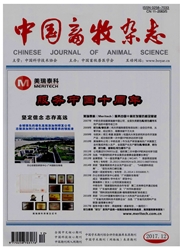

 中文摘要:
中文摘要:
选取军牧一号29日龄(7.06±0.18)kg、99日龄(44.54±9.0 4)kg和169日龄(78.93±7.37)kg去势公猪各5头,分别进行仔猪、生长猪和肥育猪3个生理阶段的动物试验。仔猪于28日龄断奶,每一阶段试验期为7d。试验期结束后屠宰,迅速采集十二指肠、空肠中段和回肠组织样品。采用Ki-67抗体或TUNEL免疫组织化学染色方法分别检测小肠上皮细胞增生或凋亡情况,同时测定小肠绒毛高度和隐窝深度。结果表明,随着猪日龄的增长,小肠绒毛高度和隐窝深度增大(P〈0.01);肠上皮细胞凋亡和增生指数逐渐降低(P〈0.001)。无论哪一生长阶段的猪,不同肠段上皮细胞凋亡和增生指数有着相同的变化规律,空肠中段最高,回肠最低(P〈0.01)。
 英文摘要:
英文摘要:
Five weanling(7.06±0.18) kg,5 growing(44.54±9.04) kg,or 5 finishing(78.93±7.37) kg General No.1 barrows,weaned on the 28 days of age,were randomly allotted to three experiments with five replicates for different growth phases,respectively.All the experimental periods were followed for 7 days.The tissue of duodenum,middle jejunum and ileum of pigs at different growth phases were collected,5 μm thick sections of small intestinal tissue were stained with the TUNEL method to assess apoptotic activity,and with Ki-67 immunohistochemistry to assess cellular proliferation.Meanwhile,villus height and crypt depth were determined.The results indicated that with the aging of pigs,the proliferative index and apoptotic index significantly decreased(P〈 0.01),and the villus height and crypt depth increased(P 〈0.01).The apoptotic and proliferative indexes had the same variation for piglets,growers and finishers(P〈0.01),the highest in the mid-jejunum and the lowest in the ileum.
 同期刊论文项目
同期刊论文项目
 同项目期刊论文
同项目期刊论文
 Recombinant soybean protein beta-conglycinin alpha '-subunit expression and induced hypersensitivity
Recombinant soybean protein beta-conglycinin alpha '-subunit expression and induced hypersensitivity Development of a monoclonal antibody-based competitive ELISA for detection of beta-conglycinin, an a
Development of a monoclonal antibody-based competitive ELISA for detection of beta-conglycinin, an a Effects of glycinin on IgE-mediated increase of mast cell numbers and histamine release in the small
Effects of glycinin on IgE-mediated increase of mast cell numbers and histamine release in the small 期刊信息
期刊信息
